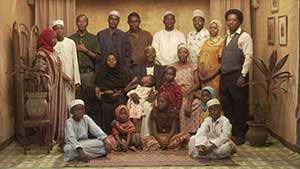TV1 – Tanzania
Posted By Gün Akyuz On 16-09-2014 @ 5:46 pm In Alerts | Comments Disabled
SCHEDULE WATCH CHANNEL PROFILE: Tanzania’s fledgling TV1 is upping its local content and production ambitions across factual, entertainment and drama to take on its rivals. Gün Akyuz reports.

Ben Amadasun
Overview
It’s still early days, but fledgling free-to-air (FTA) network TV1 in Tanzania is looking to significantly ramp up its local output and production activities, says Ben Amadasun, Modern Times Group (MTG)’s programming director for Africa.
Around 60% of TV1’s schedule is already locally made or acquired content, supplemented by foreign acquisitions. The channel is now underway with its first foreign format adaptation, The Package from Armoza, which launched in September. In addition, Amadasun says TV1 has an as-yet undisclosed local drama project in the pipeline, earmarked for launch at the end of the year or in early 2015.
The ad-funded channel, which launched in January, is MTG’s second free-to-air service in the region, following Viasat Ghana’s launch in December 2008. It too offers a broad-reach general entertainment schedule, targeting a slightly female-skewing 15-49 audience.
TV1 is available through Tanzania’s digital terrestrial network, reaching an estimated 30% of Tanzanians at launch. Tanzania was the first sub-Saharan African country to switch off its analogue signal and completed its digital roll-out earlier this year, giving the fledgling channel a level playing field in the FTA landscape.
Tanzania’s population of 46 million – Africa’s sixth largest – was a key deciding factor in where MTG would plant its next FTA flag, as well as being “one of the countries with big long-term GDP growth and a rising middle class, backed by many years of relative prosperity, which all helps,” says Amadasun.
TV1’s trajectory forms part of MTG’s wider plans for geographical growth in the region, and further FTA channel roll-outs in sub-Saharan Africa are on the cards says Amadasun, although timetables or specific territories remain under wraps.
Given the sizeable growth potential in sub-Saharan Africa – home to seven out of 10 of the world’s fastest growing economies – Amadasun points out “it makes sense to target them. All our research and data suggests that FTA channels are still big and it makes sense for us to have a presence there. We want to be there and offer the best content and digital experiences in the future, and we want to grow strongly.”
Unlike Viasat Ghana, however, TV1 doesn’t carry the Viasat name. “It’s a deliberate strategy,” says Amadasun. “We want to move forward with a new name in terms of any future territory launches, and this is the brand name we’d move forward with.”

The One Show
A big challenge facing FTA channels in Africa is a lack of regular audience measurement. TV1 currently gauges its impact through social media and ad-hoc channel-commissioned research from agencies such as Millward Brown.
“For now, social media has been one of the better ways to gauge our offering. It’s instantaneous and in Africa we seem to have a nice take-up of younger demos,” he says, although he acknowledges its lack of representativeness among viewers overall.
“We’ve had very positive feedback on new shows to the territory that people haven’t seen before and are excited about,” Amadasun says, citing acquisitions, such as US sitcom Girlfriends, reality shows like Real Housewives of Atlanta and local fact ent shows like Boys Boys. “These shows are new and innovative for market.”
MTG Africa is among a number of broadcast groups now working with international audience research companies to establish “consistent and robust research in target MTG territories,” he says, although there’s no start date yet.
“We’ve been working with companies in Ghana and Tanzania to introduce the level of research we’re used to across the group as a whole,” says Amadasun. “We think that’s going to be the future in terms of helping the ad industry and our channels to grow, and so that when people make decisions, rather than being perception-driven it will be based on facts and research, which is the cornerstone of our business.”
However, non-linear and social media platforms in particular are also integral to what the channel is trying to do, says Amadasun. “15-49 is our key target audience, but we have an affinity to 15-34s in terms of the way we programme the channel,” he says.

Boys Boys
“Moreover, we try to pay attention to and track what’s going on in social media and we want to have more of that as internet penetration increases in those territories, as it’s linked to the generations we’re targeting. What we’re seeing in our markets is that those generations are very active, although there’s no hard and fast data on this.”
Similar data for Viasat Ghana indicates that its website has grown from 90,000 to 400,000 weekly hits, and generated 200,000 FaceBook likes so far – one of the highest in the area. Moreover, a PwC report in 2012 estimated that 250 million people will have access to some form of broadband in sub-Saharan Africa by 2016, driven by mobile in particular.
“TV1 in Tanzania is also growing very quickly,” says Amadasun. “We want to use that in terms of our programming and it’s integrated into our plans for the future.”
TV1’s long-term goal is to be number one or two in the market, but Amadasun says his priority by this time next year is to establish TV1 as a ‘top of mind’ brand among audiences, “with the best content offerings, a strong local content bias as well as the best from Africa and internationally, to make them feel like they’re getting a premium channel for free. That’s the key driver for our channel,” he says.
“We want our own-produced content to start having a major impact on viewership levels for us. Our news is already seen as one of the most credible in the market. And if we do have some data by this time next year, we want to be knocking on the door of the number three and four channels in the market.”
Allied to this growth is MTG’s sister company Modern African Productions (MAP). Founded in Ghana in 2010, it expanded into Tanzania at the same time as TV1’s launch, and currently produces all TV1’s local content, including the news. However, Amadasun says TV1 is “very open to working with local producers, to pre-buy and coproduce local content, so we’re not limited to MAP.” MAP, too, is looking to grow in the region and across Africa, with productions for third parties as well as MTG channels.

Clinic Matters
Current schedule
TV1’s schedule offers a mix of Swahili and English-language content. Around 60% is local and African entertainment, fact ent, talkshows, movies and news, while 40% is made up of foreign acquired international movies and series, mostly from the US and the UK.
The aim is to attract a broad audience at all times, says Amadasun, through a simple easy-to-navigate schedule designed to build viewer loyalty.
TV1’s stripped daytime and access primetime leads into primetime from 20.00, which changes to ‘chequerboard’ appointment-to-view slots, with themed days, such as local drama on Mondays, local factual entertainment on Thursdays and big family entertainment on Sundays. The channel is also keen on creating events in the schedule.
Entertainment, formats
The channel’s big entertainment block is on Sundays from 20.00, consisting largely of acquired African shows, among them Nigeria’s Got Talent.
A recent launch was Kenyan dance show Sakata Mashariki, which is still running and, Amadasun says, has done well with viewers.
However, the slot could soon become a mix of locally produced and acquired content. “We will continue with these acquisitions, but we will try to localise them as much as possible ourselves, or buy local versions of those shows,” says Amadasun.
Another new locally originated show, which Amadasun says is now gaining a bit of traction, is primetime music format Musiki Na Wewe. The format sees experienced musicians offer advice to up-and-coming ones, giving them the chance to break though.

Siri Ya Mutungi,
Locally made entertainment also appears in TV1’s access primetime, with comedy clip format Clip Show. “We’ve got our own version, using clips from Kenya and a local comedian as a host, and it has had a lot of positive feedback from the market,” says Amadasun.
Factual, formats
Pre- and post-launch research for the channel has indicated that Africans like to talk and that news is surprisingly popular, says Amadasun.
Such preferences are already reflected in TV1’s schedule, which offers a newscast twice a day, in access primetime at 19.30 and late-night at 00.30. “We launched our news very early on, and we want to make it one of the best news services out there, and that’s getting good feedback,” he says.
“Apart from the market wanting and demanding it, it’s also one of the key anchors to the schedule, and vital to the growth in most of the African markets we want to go into.”
TV1’s local talkshow The One Show is another highlight. The series, stripped in access primetime (18.30 Monday-Thursday), is adapted from Viasat Ghana’s version.
Amadasun also cites the popular fact ent format Boys Boys (20.00 Thursdays), a local male-skewing show hosted by popular local personality Mwisho Mwampamba, a former housemate on Big Brother Africa.
TV1’s key new fact ent launch is Armoza’s The Package (13×60’), and TV1’s first foreign format. MTG’s sister company Modern African Productions is producing two versions of the show, one in Swahili for TV1 and another in English for Viasat Ghana. “It has been very well adapted to the market with very exciting stories,” says Amadasun.

Clip Show
“For us it’s the first foreign format and there’s an opportunity for us to do more,” he says. “The feeling in these territories is that they like the big formats and the big dramas, but they also enjoy community-based television, where the best side of human nature is shown, where people are giving, contributing and helping out in society. This is one of those shows that will hopefully cater for that requirement in Ghana and on TV1.”
TV1 has already aired acquired African versions of All You Need is Love and Extreme Makeover Home Edition, both of which reportedly resonated well with audiences in Africa.
Alongside news and fact ent shows, Amadasun says TV1 is keen on international nature-related acquisitions such as the BBC’s Equator, which the channel has acquired. The clear preference is for more character-driven factual shows, which Amadasun says the channel would be interested in acquiring, or possibly even coproducing.
TV1’s initial research indicated factual and documentaries appear to be less popular with viewers. “It’s the fact that people don’t have the variety that viewers are exposed to in other countries or on pay TV platforms,” Amadasun suggests. “Because we’re free TV, if viewers do have access to the sorts of high-quality blue-chip shows that we will bring to the market, they will start to see a different level of quality. Factual shows in local markets are typically around local issues, are information-led and lacking good narrative.”
Drama
TV1’s drama slate is a ‘nice mix’ of local, Kenyan, pan-African and US acquisitions, including CSI, NCIS: LA and Bones, titles that tend to perform well across the MTG group, including in Ghana, says Amadasun.
The network launched with a number of locally acquired titles, including Tanzanian drama Siri Ya Mutungi, one of the strongest Amadasun says he has seen in the market; Kenyan series Siri Toboa, which has generated good feedback on social media, as well as a chuckle among Tanzanians at the Kenyan Swahili dialect; and Clinic Matters, a Nigerian sitcom and one of Amadasun’s favourites,
TV1 also has local scripted production ambitions, with the most likely route being through coproduction, as Amadasun explains.
“Although drama is relatively cheap in Africa, the quality threshold is still low, and coproducers could help local producers boost that quality threshold. We could obviously bring our expertise from other markets to help raise those standards,” he says.
A key issue is that many African national broadcasters don’t usually pay for their dramas, which are generally advertiser-funded programmes, notes Amadasun.
Limited funding streams poses another constraint. “Financing for shows comes from aid agencies rather than from the private sector, which is what would have to happen for us to have the long-term quality that we’re looking for and volumes that we require,” says Amadasun. “That’s what the challenge is for local producers.
“We’re not expecting to commission and cover the entire cost of a production ourselves either, but if it’s a coproduction, number one, we get some input, and number two, if we’re investing decent licence fees it will help producers cashflow their productions better – and in the long term produce more for the whole market,” he says.
As well as an undisclosed project already in the pipeline, TV1 is on the look-out for strong local drama projects, specifically serialised shorter runs and preference for 30-minute formats, says Amadasun. The channel is talking to key producers in local markets to discuss how it can come onboard, he adds.
TV1 has already aired a couple of local Swahili comedies, Vituko Uswahilini and Martin, says Amadasun. “Local sitcoms is an area we want to fast-track and jump on,” he explains. “There doesn’t seem to be enough output in the territory and it’s something we want to get our hands on in the long term.”
Another obstacle to growing drama output includes how widely Swahili shows would travel. Together with the cost of dubbing into English, this makes them less attractive as potential pan-African projects. “Producing in Swahili means you limit your ancillary rights and exploitation potential. However, good stories, such as Siri Ya Mutungi, always travel,” says Amadasun.
Another significant area of content for TV1 is local movie acquisitions, scheduled at least three times a week, in both daytime and primetime. “Local Tanzanian Bongo movies are quite popular and one of the key drivers of the schedule, and we want to ramp that up even more,” says Amadasun.
While TV1 has to wait for the pay TV window before being able to air movies, it doesn’t have any supply issues. “The trick is to package the movies in a way that creates an event, such as the upcoming Timiza Ndoto Yako [Achieve Your Dream], with films centring on themes that inspire people to achieve their dreams. TV1 seeks exclusive FTA rights to acquired movies,” Amadasun adds.
Article printed from C21Media: https://www.c21media.net
URL to article: https://www.c21media.net/tv1-tanzania/
Click here to print.